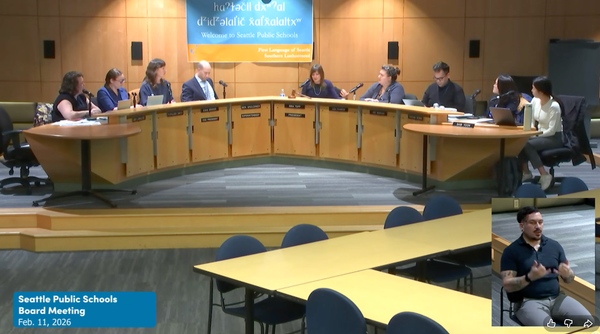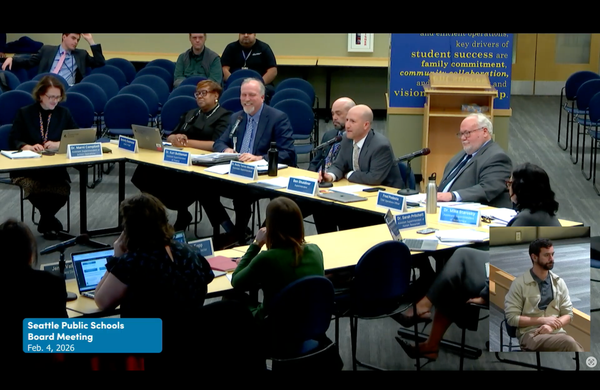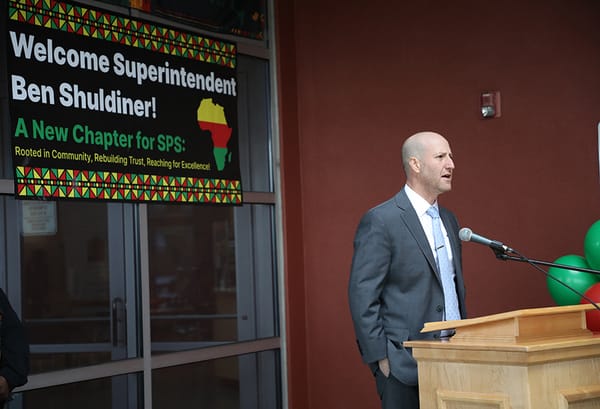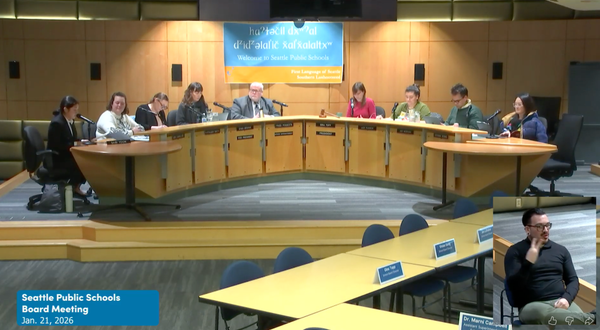Issue 5 -- November 19, 2025 Board Meeting Recap
In this issue: Beth Day and Julie Letchner recap the November 19 school board meeting, the last with the current board lineup.

In this issue: Beth Day and Julie Letchner recap the November 19 school board meeting, the last with the current board lineup.
Watch: YouTube video
Read: Transcript
- Roll Call
All current School Board Directors were present in-person.
- Appreciation for Departing Board Members
The departing Board members are Brandon Hersey, Michelle Sarju, and Sarah Clark. Board members staying on gave comments honoring the departing members and the departing members gave comments reflecting on their experiences on the board and advice for the board going forward. Hersey was originally appointed to the board in September 2019 and then ran for and received a full term starting in 2021. He served as Board President during part of his tenure. Sarju served for one full term starting in 2021. Clark was appointed in April 2024 and served not-quite two years of a term after an unsuccessful election bid.
- Superintendent Comments
Superintendent Podesta attended the Black College Expo, lots of scholarships were given out!
- Student Member Comments
The Student Directors are revising board policy around student members and creating a handbook for Student Directors. They are also trying to expand their outreach and engagement efforts across the district.
- Board Committee and Liaison Reports
As Legislative Liaison, Director Rankin discussed changes at the federal level and the attempts to dismantle the Department of Education (AP News Article). She also mentioned upcoming statewide initiatives that affect the rights of transgender students. One initiative concerns the previous “Parents Rights” initiative and changes made by the legislature to protect trans students. The legislature’s changes resolved disagreement with previously passed legislation that established protections for trans students. The other initiative concerns the participation of trans students in school sports. More information and links to the full text of these initiatives can be found on the Washington Education Association website.
- Public Comment
One theme of public comment was dismay at SPS calling for a new trial in the case where a student was punched by a teacher and failing to protect students in their care from abuse. The other major theme was around the use of technology in the classroom, namely how it has rapidly increased since COVID with little oversight. This includes use of school-provided devices and EdTech software and AI applications.
- Action Item - 2026 Legislative Agenda
Here is a link to SPS’s 2026 Legislative Agenda. In addition to serving as the Seattle School Board’s Legislative Liaison, Liza Rankin is also a board member for the Washington State School Directors Association (WSSDA). WSSDA often works with school districts statewide to develop its legislative priorities. You can see the WSSDA priorities reflected in the SPS legislative agenda, which Rankin presented to the board for adoption. Director Rankin mentioned issues particularly affecting Seattle Public Schools, namely the continued underfunding of items such as Transportation, Special Education, and Materials, Supplies, and Operating Costs (MSOC). According to Rankin, her main goal is to protect state education funding from cuts. Another concern is the retail sales tax affecting schools; here is the Seattle Times Article on the issue. The 2026 Legislative Agenda was passed unanimously by the Board.
- Action Item - New Superintendent’s Employment Agreement
Here is a link to the Employment Agreement with incoming Superintendent Shuldiner. Annual compensation will be $365,000 with a $60,000 contribution to a retirement account for a total of $425,000. The contract begins February 1st and goes through June 2028. He gets an extra $40,000 bonus if he stays through February 2030. The Board unanimously approved the contract.
- Work Session - Student Cellphone and Personal Technology
Here is a link to the District’s presentation and informational briefing on the development of its district-wide student cellphone and personal device usage policy. Staff detailed the variety of policies around cell phones and personal devices throughout the district and summarized student and staff/school leader feedback from engagement sessions. See the slide below for general current policy: Elementary – Not Allowed, Middle School – Away for the Day, High School – Away during class, unless teacher gives permission.
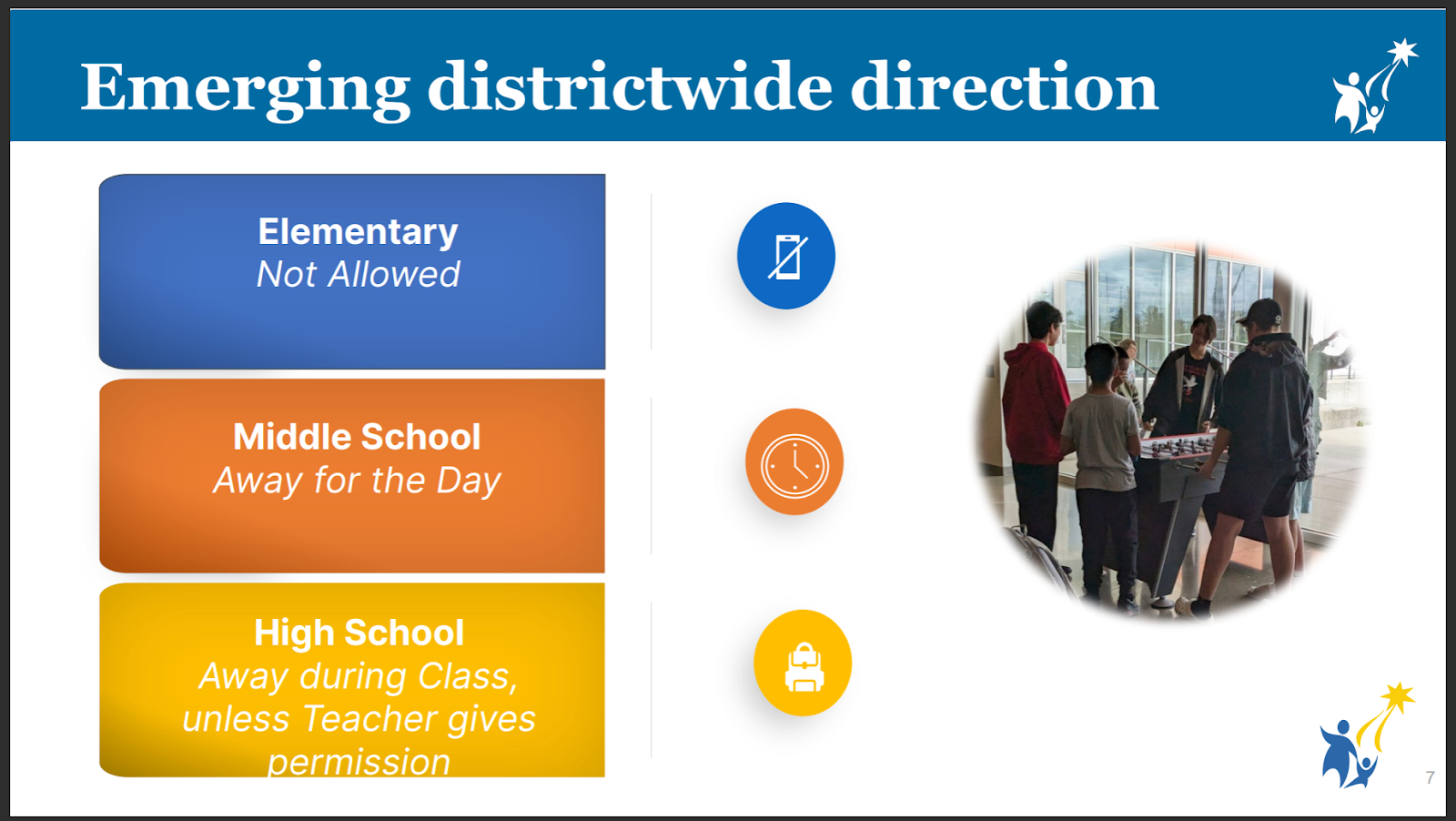
Concerns about cell phone usage at school mainly focused on it as a major distraction during teaching and learning and the potential for bullying and other social media influenced negative interactions during the school day.
High school students were concerned about implementing an “Away for the Day” policy where they would not be allowed to use phones during passing periods or lunchtime. They also said they use their phones to access websites blocked by SPS for schoolwork. Students said that as older students will be transitioning to independence, they needed to learn self-moderation now. Parent board directors, particularly those with teens like Director Briggs, pushed back on this narrative during the discussion, pointing out that if a site was blocked by SPS it was probably blocked for a reason, and had a hard time believing there was an academic necessity for the phones – and that if there is a necessity, this presents an equity issue. Board members seemed to prefer an “Away for the Day” policy for high school as well.
Another concern the Board members had about a more liberal class-by-class policy was that it would put the onus of enforcement on teachers versus a more universal “Away for the Day” policy. Director Rankin wanted to ensure that no child who needs access to a personal device due to reasons of disability was denied use. Seems like the answer was that “that doesn’t happen.” [Beth’s note: It was unclear whether the disability needed to be documented in a 504 or IEP to be allowed. I know of students who have been denied access despite 504 documentation, but that was a couple years ago, and maybe policy has been refined.]
As this was an initial work session, no clear decision was made about what the rules should be for high school students. Hopefully there will be some future updates.
- Work Session - AI and Data Privacy
Here is the link to the presentation on AI and Data Privacy.
Mike Starosky, assistant superintendent of academics, presented a rosy outlook for the potential of generative AI in SPS classrooms. Commentary from the board afterward was decidedly skeptical. Because this was a working session, the discussion was not directly in support of any upcoming board or staff decision.
Starosky’s AI outlook was based on hypothetical examples and direct outreach with SPS high school students, including a video of SPS students discussing their use of AI. They describe using AI as a study partner; as a way to get started on a writing prompt; as a tool for providing feedback on their writing; and as a resource for summarizing large documents.
None of the students in the video mentioned using AI to cheat. Suspicious, student board director Josephine Mangelsen, a high schooler, stated flat-out during Q&A: “I know for a fact that the main use of AI at my school so far has been cheating.” She went on to recommend that the voices of teachers be prioritized over the voices of students when creating AI guidance. At that comment, the attendees in the room broke into spontaneous applause.
Student director Mangelsen also pressed Starosky on his claim that generative AI helps to spark students’ creativity. She cited her belief that, “The purpose of creative assignments [such as writing or creating art] in school is to create your own ideas and thoughts.” Starosky responded, “It’s for people to be curious about anything. So, how people read a book, listen to music…anything.”
Starosky’s presentation did not reference any research relating to AI in classrooms or even in other contexts. When student director Sabi Yoon asked about this omission, Starosky pointed her to the district’s AI website. As of this writing, we found no research linked there, nor in the district’s five-page AI handbook.
In additional comments, Director Briggs expressed alarm over many “red flags”, including a concern that the presentation sounded like talking points for big tech companies. She invoked Macklemore: “We’re being tricked by business!” The room broke into applause for a second time when Briggs expressed hunger for information sources without financial stakes in AI.
For more information and insight on this presentation, see Issue 4 of The Bulletin by Emily Cherkin.
